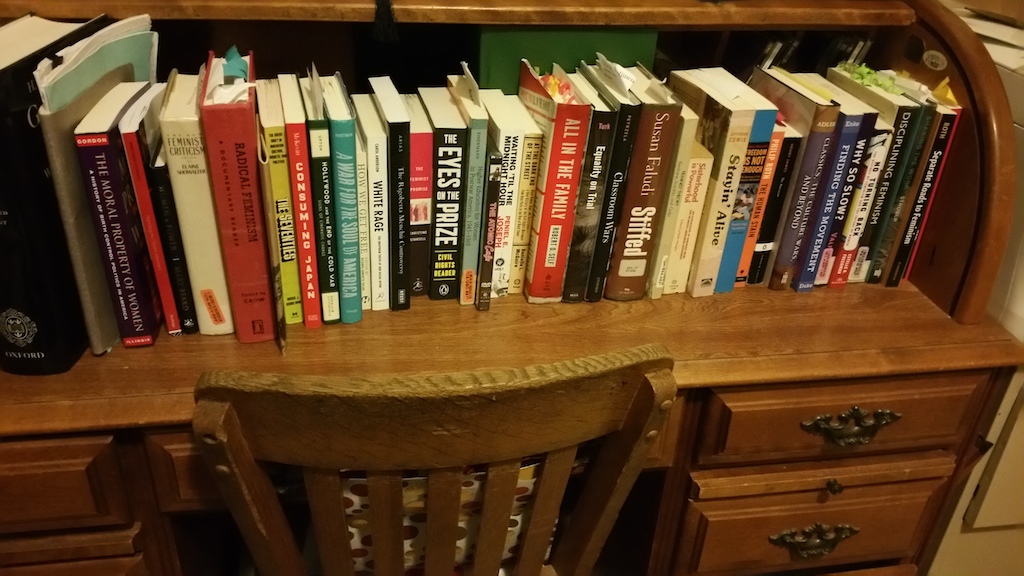O let my books be then the eloquence
And dumb presagers of my speaking breast,
Who plead for love, and look for recompense
More than that tongue that more hath more expressed.
Oh! learn to read what silent love hath writ:
To hear with eyes belongs to love’s fine wit.
These last six lines of Sonnet XXIII sound one of the major themes of Shakespeare’s sonnet sequence: the power of the written word to guard the lover, his beloved, and his love itself against the ravages of time. Throughout the sonnets, poems, tablets, whole books are distillations of the author’s person and powers.

My office at the end of the semester. I left it like this and went on vacation. I’m not sorry.
This idea – books are persons by proxy – was an important if under-explored concept in the canon wars of the 1980s. The idea that a reading list represented not merely a set of ideas but a set of people, a set of identities played a crucial role in student demands for curricular change at Stanford. The desire of students to see themselves, their own identities, reflected in the books on a syllabus was dismissed by many defenders of the “core reading list” as narcissistic and naïve. The point of reading lists, the point of college, was to expose people to other identities besides their own. Besides, the core’s defenders argued, the greatness of the books on the reading list transcended the particular times and places and even people who wrote them; they spoke to all times and places.
But that idea – that truly great works of literature are those that transcend the particularities of their origins and sound “universal” themes – was woefully underexamined by those who staunchly defended it. (I would note that, as far as I can tell, none of the professors who defended that idea hailed from the history department. However, it was something of an article of faith among the many professors in the English department.) But that idea was certainly challenged by those advocates for curricular change who argued that the reading list was an identitarian relic of a very particular worldview: “dead white European males.” The claim to universalism for these texts was a way of preserving the authority of a white Western patriarchy.
Interestingly, defenders of the reading list offered many counter-arguments pushing back against the “whiteness” or the “Europeanness” of the reading list – Augustine was an African! the Bible’s origins lie in the Middle East! And of course they claimed that the “maleness” of the authors was merely coincidental – unmarked, leaving no mark that could not be covered and subsumed in “humanity” more generally. But no one took up what seems to me to be the more interesting modifier: “dead.” That word spoke against the claim of transcendence, spoke against the claim that books – or, at least, those books — were stand-ins for living people, repositories of still-living voices that might speak from their pages. Yet this critique came from the same students who wanted to read books that reflected or spoke to or somehow represented their own lives and experiences as non-white and non-European and, much less emphasized, non-male.
What strikes me now, looking at both sides of this debate, is the idea of books as proxies for particular people or particular kinds of people, including the kind of person who can write something “great” or “transcendent.”

The day after I got back from vacation, I cleaned my office. Still have to do the filing. But I can work in this space now.
That notion of representation – the presence of this book represents my presence here in the university – was a basic assumption driving this debate. It was an explicit assumption of the critics of the reading list. Can I argue that it was an explicit assumption of the defenders of the reading list? Did they know the work that words like “universalism” and “humanity” and “transcendence” were doing to protect their presence and position in the university? Does it matter whether they knew that or not?
Books as (material?) stand-ins for the particular lives of their authors and their readers: this is the underlying assumption that I must treat as utterly strange.

I inherited my dad’s desk. I use it as a bookshelf/filing cabinet. These are some of the books I’m reading/assigning for my “American culture since 1970” seminar.

5 Thoughts on this Post
S-USIH Comment Policy
We ask that those who participate in the discussions generated in the Comments section do so with the same decorum as they would in any other academic setting or context. Since the USIH bloggers write under our real names, we would prefer that our commenters also identify themselves by their real name. As our primary goal is to stimulate and engage in fruitful and productive discussion, ad hominem attacks (personal or professional), unnecessary insults, and/or mean-spiritedness have no place in the USIH Blog’s Comments section. Therefore, we reserve the right to remove any comments that contain any of the above and/or are not intended to further the discussion of the topic of the post. We welcome suggestions for corrections to any of our posts. As the official blog of the Society of US Intellectual History, we hope to foster a diverse community of scholars and readers who engage with one another in discussions of US intellectual history, broadly understood.
The notion that books are persons by proxy is at most a poetic truth, and I’m not even sure it’s that. The students were, as the post indicates, ensnaring themselves in a bit of a contradiction by, on the one hand, calling certain canonical authors or works “dead,” and, on the other hand, treating books as representatives of “living” voices — both the authors’ and the readers’.
Sometimes a “dead white European male” author can sound “universal” themes in a way that subverts those themes’ traditional story lines, for lack of a better phrase. Shakespeare’s sonnets themselves are a breathtaking case in point, appealing in the opening sequence to a young man’s (warranted, in this case) vanity to convince him to marry and procreate, while also sometimes conveying the quality of a homoerotic fever-dream — and claiming that the poet’s genius will save his love from “devouring time” (no. 19).
I’m not sure the preceding paragraph has all that much to do with the post, so I’ll end the comment here.
Louis, thanks for this comment. Yes, the Sonnets are a good reminder that curricular change was not a matter of “queering the canon,” because it was always already queer. On the other hand, it wasn’t always already “the canon” — not until someone suggested a few curricular alterations did a reading list become retroactively canonical. (By the way, it’s worth noting that not a single work of Shakespeare was on the required reading list, but two works of Galileo were.)
I am not arguing that the students were wrong to argue that changing the reading list would result in their “representation” on the syllabus and in the curriculum — that was the assumption shared by them and also by their opponents in the debate. The argument was not that readings might reflect particular identities (with the exception of those books already on the list, because they somehow magically “transcended” the identities of their authors). The argument was, rather, that a focus on particularities was mistaken and somehow self-absorbed.
But no one in the debate questioned the power of books to do this work of representation. And that’s kind of interesting to me, though I don’t know that I have a short route to explaining it. Maybe I should take the long way around on this one anyhow.
Thanks for the reply, L.D.
Yes, the shared assumption about books and “representation” is interesting. I’m not sure exactly how to explain it either (but, fortunately, I’m not writing a book on this).
I wonder what might have happened if some dispassionate extra-terrestrial had materialized at Stanford in the relevant years, gathered the parties in a room, and said something like: “There is a case for changing the reading list, but it’s not that adding Frantz Fanon or MLK or Mary Wollstonecraft will represent your [the students’ identities] better; it’s that those authors addressed experiences of *other* people [who might resemble you in some ways, but who are not you] that have been left out.”
And to the faculty defenders, the ET would have said: “Stop arguing that the works on the list ‘transcend’ the particular identities of their authors. From now on the words ‘representation’, ‘identities’, ‘transcendent’ and, for good measure, ‘canon’ are banned from this discussion, and you will have to make your arguments without them [this applying to both sides].”
Then all the disputants would have adjourned to another room, agreed within a few hours to remove some items and add some other items to the list, and that would have been that.
All I know is that books are my most enduring friends, teachers, and interlocutors and have been with me all of my life. The author is incidental. Books have shape my political and social views and maybe they have given me an identity beyond my limited life. That is why when ever a new book arrives in the mail my husband announces, “you have new friend!” And so I do. “We read to know that we are not alone” C.S. Lewis.
“The author is incidental.” That was one of the “universalist” arguments made by the New Critics and their epigones on the English faculty at Stanford. But is that something you actually believe? If so, why would you interview authors for a podcast? Why would the author’s “take” or further perspective or critical assessment of his/her own work matter if the work itself is all that matters and the author is merely incidental?
Of course, to say the author is incidental is also, ironically, a Foucauldian argument to make — authorship/authority is an after-effect of discourse, rather than a generative source of ideas. But to argue that is to privilege the immaterial over the material, the abstract over the concrete and personal, and to give ideas themselves agency instead of giving agency to the people who make them.
But of course no one expects you to give an account of “all you know” here. And I certainly understand from experience what it means to have found in a book a friend for life.
But it was precisely these kinds of claims about transcendence (or lack thereof) that were at issue historically in the debates I’m looking at. Do works “transcend” their authors? Many professors were ready to say that Dante’s and Dickens’s works did, but they wouldn’t say the same for the works of Jane Austen or George Eliot. They were ready to say that Faulkner’s works were transcendent, but not Toni Morrison’s or Countee Cullen’s or Flannery O’Connor’s. Arthur Miller was a great playwright, of course, but for them the jury was still out on Lorraine Hansberry. Lionel Trilling was a great author, but Mary McCarthy was not. Odd how consistent a marker something as “incidental” as the known or presumed gender or race of the author actually was in the shape of the curriculum as it stood — a feature pointed out by the curriculum’s critics, certainly.
In any case, the claim that “the author is incidental,” much like the claim that “the author [or the book] is representational,” can do a lot of work — the question is, what kind of work does one use such claims to do?